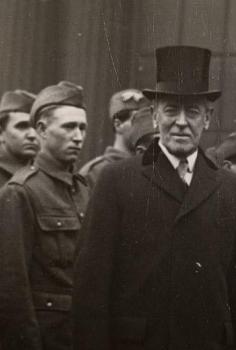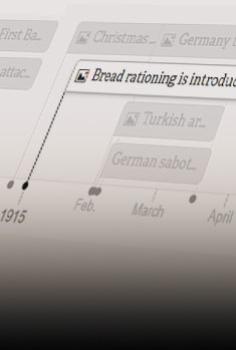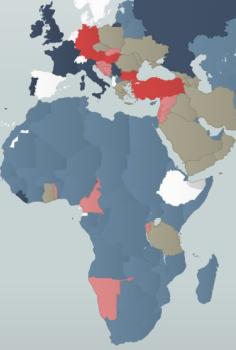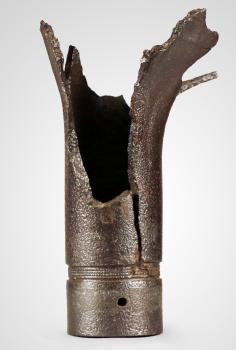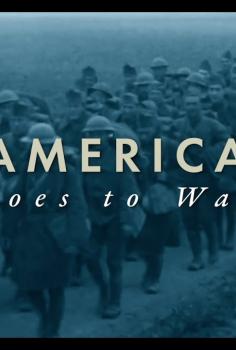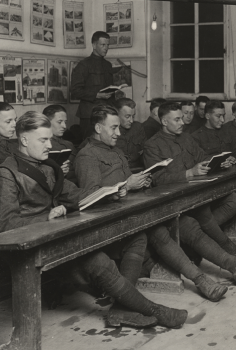Who fought in World War I?
World War I was the first global war. This interactive map gives you an abbreviated glimpse into which countries and territories were involved in the Great War and how they were aligned.
Whether they fought with the Allied or the Central Powers, or stayed neutral, WWI still touched almost every country and region on the planet.
Tap on any country or territory on the map to learn more.
Starting in the Balkans, the treaties and alliances between the countries of Europe quickly pulled both allies and enemies across the continent into war. Supplies, soldiers and labor were drawn from colonies and commonwealths around the world. Fighting spread to West and Southwest Asia, Russia, Africa and China, and the naval war engulfed the seas.
Additional Countries and Territories:
This list includes some of the territories and regions that may be harder to find on the global map of WWI combatants above.
Africa
Alignment: Supported Allied Powers
Historic name: British Mauritius
British Mauritius (now Mauritius) was a colony of Great Britain and declared war on Germany on Aug. 4, 1914 with the United Kingdom. The island had a diverse population, including Indo-Mauritians, Franco-Mauritians, and British colonists. Many people volunteered to help in the British war effort. Over 1,500 joined the Mauritius Labour Battalion in Mesopotamia, mostly Indo-Mauritians, Sino-Mauritians, and Creoles. Another 520 served in the British and French armies, 200 joined the Merchant Navy, and some became pilots. During the war, sugar production on the island also increased to support the war effort.
Alignment: Supported Allied Powers
Historic name: Colony of Mayotte and Dependencies
In 1914, Mayotte was a French colony within the larger Colony of Mayotte and Dependencies and was subordinated to Madagascar. It entered the war with the French in August 1914. Madagascar recruited over 40,000 soldiers and laborers to help the French army, mostly poor farmers or formerly enslaved people called Malagasy tirailleurs. They were sent to fight in Europe and the Mediterranean toward the end of the war. During the war, 3,980 Malagasy soldiers died in combat, and 3,060 died from illnesses related to their work and fighting.
Alignment: Supported Allied Powers
Réunion, a French colony, entered the war in August 1914 with the French. While no fighting occurred on the island, it served as a strategic naval base for French and Allied forces. Over 14,000 Réunionese participated in the war, with 7,000 casualties. Notably, aviator Roland Garros – the first to fly across the Mediterranean – fought and died in the conflict.
Alignment: Supported Allied Powers
Saint Helena, a British colony, declared war on Germany on Aug. 4, 1914. Located near German South West Africa, the island raised a volunteer force of 60, with 165 enlisting in the British military. By the war’s end, the local militia known as the St Helena Rifles had 46 of its members serving in Europe and 8 killed in action.
Alignment: Supported Allied Powers
Seychelles was a British colony that declared war on Germany on Aug. 4, 1914. Starting in 1916, 791 Seychellois men volunteered to support the British war effort, mostly in logistical roles, with over 200 dying overseas.
Alignment: Supported Allied Powers
Historic name: British Somaliland, Italian Somaliland
Present-day Somaliland was divided into British and Italian colonies. Around 2,400 men served in the Tirailleurs Somalis on the Western Front, with 460 killed. Many others worked as laborers under harsh conditions. The Dervish State, led by Muhammad Abdullah Hassan, sought independence but was defeated in 1920.
Asia
Alignment: Supported Allied Powers
Historic name: Straits Settlements
Christmas Island was part of the British Straits Settlements, which included Penang, Singapore, Malacca, Dinding, and the Cocos Islands. The island saw no fighting, but the region experienced naval conflicts including the Battle of Penang – the only battle in British Malaya during World War I.
Alignment: Supported Central Powers
Historic name: Palestine and Transjordan
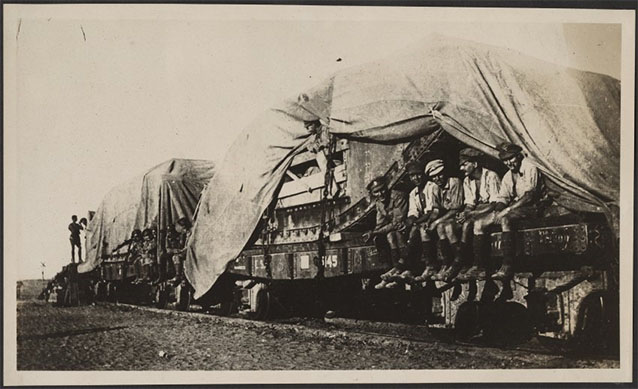
Palestine was part of the Ottoman Empire during World War I. The Ottomans joined the Central Powers in October 1914. They treated Arabs as second-class citizens, forcing many into labor battalions, arresting them, or executing them. Some Arabs fought with the British under Faisal I while others fought alongside Ottoman troops. Civilians suffered from battles, famine, disease, drought, locusts, and blockades, with over a million deaths. The Ottoman Empire was dissolved in 1923, and the British claimed Palestine as a mandate, with borders later redrawn during the 1948 Arab-Israeli War.
Alignment: Supported Allied Powers
Macau was a colony of Portugal and entered World War I on March 9, 1916, after Germany declared war on Portugal. The territory faced tensions with both China and Germany, including border disputes and anti-Portuguese propaganda. The small Macanese garrison did not play a major role in the war, but it maintained control of the region until the conflict ended. The people of Macau supported the war effort by contributing £30,000 to Portugal.
Alignment: Supported Allied Powers
Historic name: Sultanate of the Maldive Islands
The Maldives was a British protectorate during the war, and declared war on Germany on Aug. 4, 1914 with the United Kingdom. The islands did not see any fighting, but they served as an important location for many British naval ships.
Alignment: It's Complicated
Historic name: Portuguese Timor, East Timor
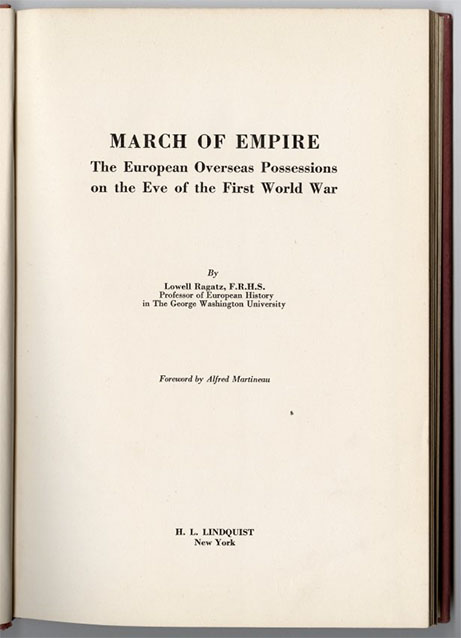
Timor did not fight directly in WWI, but the war affected its relations with colonial powers and trade. After Germany declared war on Portugal on March 9, 1916, Portuguese forces deployed to Timor to maintain control. Timor faced food shortages, delayed coffee revenues, poor harvests, and interruptions to salaries and taxes, leading to internal unrest that continued well beyond the war.
Caribbean
Alignment: Supported Allied Powers
Historic name: British Leeward Islands
The British Virgin Islands were part of Great Britain’s Leeward Islands. Men of fighting age were drafted into the British West Indies Regiment, which fought in Europe, West Asia, and Africa. With their history of slavery and plantations, the British continued to exploit the Islands for resources like sugar during the war. A war tax on mail from the region raised about £2,000,000 for Britain’s war effort.
Alignment: Neutral
A colony of the Kingdom of the Netherlands, which remained neutral during the war.
Alignment: Supported Allied Powers
Historic name: Guadeloupe
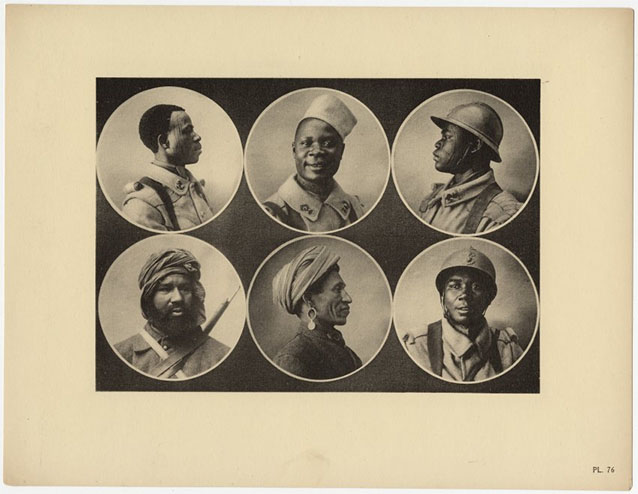
Guadeloupe was a colony of France, which entered the war in August 1914.
Alignment: Supported Allied Powers
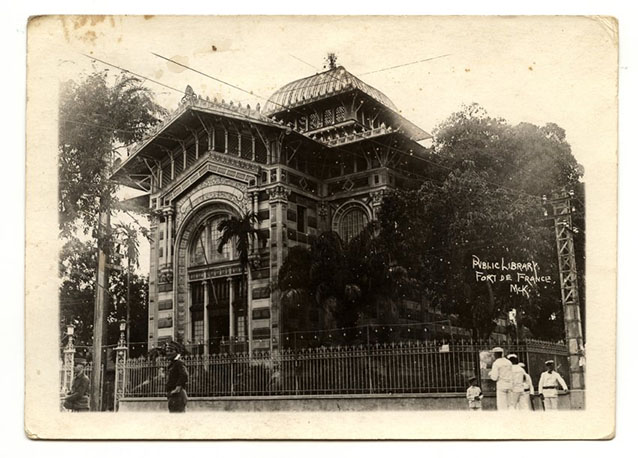
During World War I, Martinique was a French colony. France entered the war in August 1914 and required the island to send about 1,000 soldiers each month to help with the war effort. In total, around 18,000 people from Martinique served in the French military, and 1,306 died between 1914 and 1918. The island also supplied France with large amounts of rum, sugar, and other goods, and its ports were used by both French and (starting in 1917) U.S. ships.
Alignment: Neutral
Saint Barthélemy, a French colony, entered the war in August 1914. While no battles occurred on the island, it served as a strategic port for Allied ships and supplies. Some residents are known to have served in the war, though exact numbers are unknown.
Alignment: Supported Allied Powers
During WWI, French Saint-Martin sent at least 76 men to fight at the Marne and Dardanelles, while Dutch Sint Maarten remained neutral. With 16% of the male population leaving for service and others relocated to support the war, the island’s population declined, though sugar agriculture remained its economic backbone.
Alignment: It's Complicated
Historic name: Curaçao and Dependencies
During WWI, the island was split into Dutch Sint Maarten (neutral) and French Saint-Martin (at war). The French side conscripted locals, sending at least 76 Saint-Martinois to the Marne and Dardanelles. With 16% of men leaving and others relocated to support the war, the population declined, while the economy (based on sugar) was disrupted.
Europe
Alignment: Supported Allied Powers
The Channel Islands, a British dependency, declared war on Germany on Aug. 4, 1914. No fighting occurred on the islands, but many residents served in the British Army and Royal Navy, including at the Battle of Jutland.
Alignment: Neutral
Historic name: Faroe Islands
The Faroe Islands, part of the Kingdom of Denmark, were affected by Denmark’s neutrality declared on July 31, 1914. The islands faced trade restrictions, food shortages, and economic strain. In 1917, Germany’s unrestricted submarine warfare sank dozens of Faroese fishing vessels.
Alignment: Allied Powers
Historic name: Gibraltar
Gibraltar, a British colony, declared war on Germany on Aug. 4, 1914. Residents formed the Gibraltar Volunteer Corps for local defense, and the colony was used for convoy collection and anti-submarine operations.
Alignment: It's Complicated
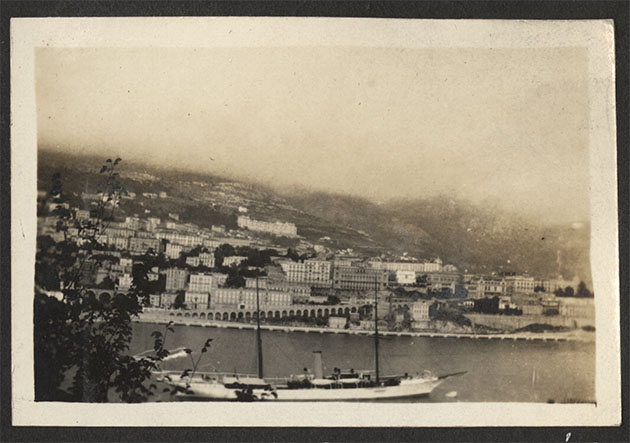
Monaco stayed neutral during World War I. In July 1918, it signed the Franco-Monégasque Treaty with France. In return for French protection, Monaco gave up full control over its foreign policy and ensured that a German monarch could not take the throne.
Alignment: Neutral
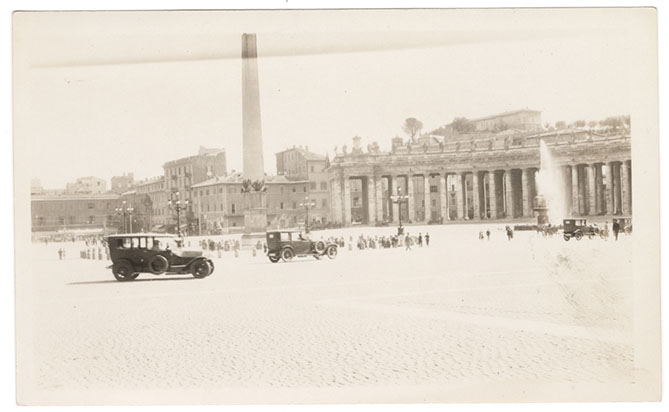
Vatican City did not exist as an independent state and was part of Rome under Italian control. Pope Benedict XV maintained strict neutrality, issuing humanitarian appeals, aiding prisoners and refugees, and condemning the war. His 1917 Peace Note largely went unheeded, but the conflict reinforced the Papacy’s role as a global advocate for peace and humanitarianism.
Oceania
Alignment: Supported Allied Powers
Historic name: American Samoa/Eastern Samoa
American Samoa became a U.S. territory in 1900. During the 1918 flu pandemic, the U.S. Navy kept ships under strict quarantine, which prevented any illness or death on the islands.
Alignment: Supported Allied Powers
The Cook Islands, a British colony, declared war on Germany on Aug. 4, 1914. The islands sent about 500 men in five contingents to fight alongside Māori troops in Egypt. The 2nd and 3rd contingents joined the Sinai-Palestine campaign and supplied ammunition for the Royal Artillery.
Alignment: Supported Allied Powers
Historic name: French Sphere: Austral, Gambier, Marquesas, Society and Tuamotu Archipelagos
French Polynesia was a French colony that included the Austral, Gambier, Marquesas, Society, and Tuamotu Archipelagos. It entered World War I in August 1914. In September 1914, German cruisers attacked Papeete, sinking the gunboat Zélée and freighter Walküre and shelling the town. The islands sent about 1,000 troops to fight in Europe.
Alignment: Supported Allied Powers
Historic name: Gilbert and Ellice Islands
The Gilbert and Ellice Islands (now Kiribati) were a British colony during World War I. Some men from the islands served with the 3rd Māori Reinforcement, with 30 joining the Māori contingents.
Alignment: It's Complicated
The Marshall Islands were a German protectorate during World War I. Germany had controlled the islands since the 1880s, but in September 1914, Japan invaded and occupied them for the rest of the war. In 1919, the Treaty of Versailles officially gave control of the islands to Japan.
Alignment: It's Complicated
Historic name: German New Guinea/Nanyo/South Seas Mandate
Modern-day Micronesia was made up of several islands that were German protectorates during World War I. In September 1914, Japan invaded the islands and controlled them for the rest of the war. In 1919, the Treaty of Versailles officially gave the islands to Japan.
Alignment: It's Complicated
Historic name: Marshall Islands
The Marshall Islands were a German protectorate during WWI. Japan invaded in September 1914 and occupied the islands for the rest of the war. The 1919 Treaty of Versailles officially gave the islands to Japan.
Alignment: Supported Allied Powers
Niue, a territory of New Zealand and a British Protectorate at the time of the conflict, saw no direct fighting on the island during World War I. About 150 Niueans enlisted in New Zealand forces, and the population contributed £165 to the New Zealand Red Cross. Niuean soldiers faced challenges adapting to cold climates, new diets, and integration into English-speaking units.
Alignment: It's Complicated
The Northern Mariana Islands were a German protectorate during WWI. In September 1914, Japan invaded and occupied the islands for the rest of the war. The Treaty of Versailles later placed them under a League of Nations mandate administered by Japan.
Alignment: It's Complicated
Historic name: German New Guinea, Micronesia
At the start of WWI, Palau (then part of German New Guinea) was a German colony. Japan seized the island in 1914, and after the war, the League of Nations granted Japan full administration under the South Seas Mandate.
Alignment: Supported Allied Powers
The Pitcairn Islands, a British colony, declared war on Germany on Aug. 4, 1914 with the United Kingdom. Their remote location meant little direct impact from the war, though changes in shipping routes affected merchant traffic.
Alignment: Supported Allied Powers
Historic name: Union Islands/Union Group, Gilbert and Ellice Islands
Tokelau, then part of the Gilbert and Ellice Islands, was annexed as a British colony in 1916 and was later awarded to New Zealand by the Treaty of Versailles. The islands supplied phosphate for the war effort and contributed about £10,000 to Britain. Several locals volunteered with the Māori Contingent and the Gilbert and Ellice Islands Contingent; 25 men went to Europe, and 21 returned.
Alignment: Supported Allied Powers
Historic name: Gilbert and Ellice Islands
The Gilbert and Ellice Islands (now Tuvalu) were a British colony that entered the war in August 1914. Some men enlisted with the 3rd Māori Reinforcement, including Sergeant Kaipati, the only documented Tuvaluan participant.
Alignment: Supported Allied Powers
Historic name: New Caledonia
Wallis and Futuna were administered by French-controlled New Caledonia. Many islanders, including Kanak Melanesians, served as tirailleurs in the French colonial military. The French occupied extensive areas of land for the war effort, which caused tensions with locals – culminating in a 1917 revolt led by Chief Noël of Tiamou, which was violently suppressed by French authorities.
South America
Alignment: Supported Allied Powers
Historic name: Falkland Islands
The Falkland Islands, a British colony, declared war on Germany on Aug. 4, 1914. The islands were the site of the Battle of the Falkland Islands on Dec. 8, 1914, where British forces defeated the German East Asia Squadron, killing Vice-Admiral von Spee and sinking several ships. The battle strengthened the islands’ role as a British naval base.
Alignment: Supported Allied Powers
Historic name: French Guiana
French Guiana, a French colony, entered World War I in August 1914. Before the war, it was known as a French prison colony, housing prisoners like Alfred Dreyfus. In 1915, it had border disputes with Brazil and Suriname. Soldiers from French Guiana served with the French colonial or metropolitan forces.
Alignment: Supported Allied Powers
South Georgia and the South Sandwich Islands were British territories when Great Britain declared war on Germany on Aug. 4, 1914. Though far from the fighting, the war increased demand for whale oil – one of the islands’ key exports – used in soaps and explosives.
This project was made possible in part by the Institute of Museum and Library Services ARPML-250549-OMLS-22

